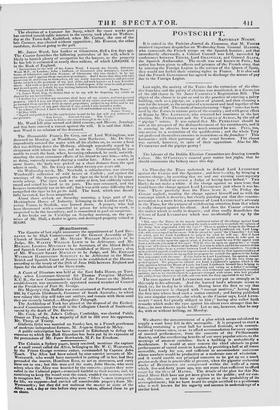The labours of the Dublin Election Committee are drawing towards
a close. Mr. O'CoNNELL's counsel gave notice last ;night, that he should commence the bribery cases this day.
On Thursday the Times undertook to defend Lord LYNDHUREIT against the Courier and the Spectator ; and how?—why, by bringing a counter-charge—by asserting that we and our evening contemporary have been " bribed to accuse a Judge of having been bribed." Two blacks do not make a white if the charge against us were true, that would leave the charge against Lord LvNutitntsv just where it was be- fore. There precisely does the Tines leave it. On Friday the Courier replied ; treating the charge against himself and lis with the contempt which it deserves, but clearly pointing out that this counter- accusation is a mere feint, a manoeuvre of Lord LYNDHURST'S advocate in the Times, for the purpose of withdrawing attention from that which is really charged against his client. And then the Courier returns to the matter which is really in dispute ; and thus coolly demolishes the defence of Lord LvNoneasT which was incidentally set up by the Timcs- - Hut, says the Times, in its merely incidental notice of the charge against Lord Lyndhurst, • who Ind a patty dreading the truth would wish to exclude the opinion of the Judge last acquainted w ith the ease ?"I'llere is !mother Judge in the House of Lords, quite as well ' acquainted a WI the case' as Lord Lyndhurst, viz. Lord Lang- dale. who was couusel iii the cause. W ill lie attend. to • assist' the Chancellor ? Let him be asked, and let Lord Lyndhurst be .011101 by what he will say. But if Lord Langdale, loving beau counsel III this cause. would surely refuse to take part in hearing and voting upon the appeal. what. d Prfiori. 'would he say if the appeal were front a deliberate judgment of his oa n ? Will he ever sit upon an appeal fat a a 'crack judglient' of Warta it as Master of the hulls? Let him be asked. and let the answer of this high minded Judge be as a verdict between Lord Lyndhurst and ourselves. So acute& man as Lord Lang.lale would nut be imposed on tor a moment by that ingenious Ildlacy of the Tines. which e:nhiste in saying that we propose to' exclude the opin;an or the Judge best acquainted a it It the case.' If this J alive he Lord Lyndhurst. his 01 • cannot be • excluded ;' far it forms the subject matter or the appeal ; it is the vet y thing ap- pealed against. We propose to exclude mu Lord Lyndhurst's opinion, which is the only question before the House of Lords. but Lord Lyndhurst himself from helping to decide that question. We object to his speaking and voting as a Judge (• assisting' it may be called) upon an appeal against his own deliberate and elaborately-recorded opinion ; just as ac should object to a prisoner charged with crime, who had pleaded not guilty, being :Mimed to sit, talk, anti vote with the Jury appointed to try him."
The case against Lord LYNDHURST was never put so strongly as in this reply to his advocate. And the learned lord's advocate seems to think so; for to-day he is silent. Having been the first to say that Lord LyNDHURST is charged with " corrupt motives;" having been the first into whose head such a notion entered ; and having published his own singular conceit,—for which, as the Courier says, Lord LYND- HURST " must feel greatly obliged to him ;" having also called forth remarks which make the case against his client even stronger than be- fore,—he now throws op his brief! Let us see, however, what he may
do, with or without bribing, on Monday.


























 Previous page
Previous page